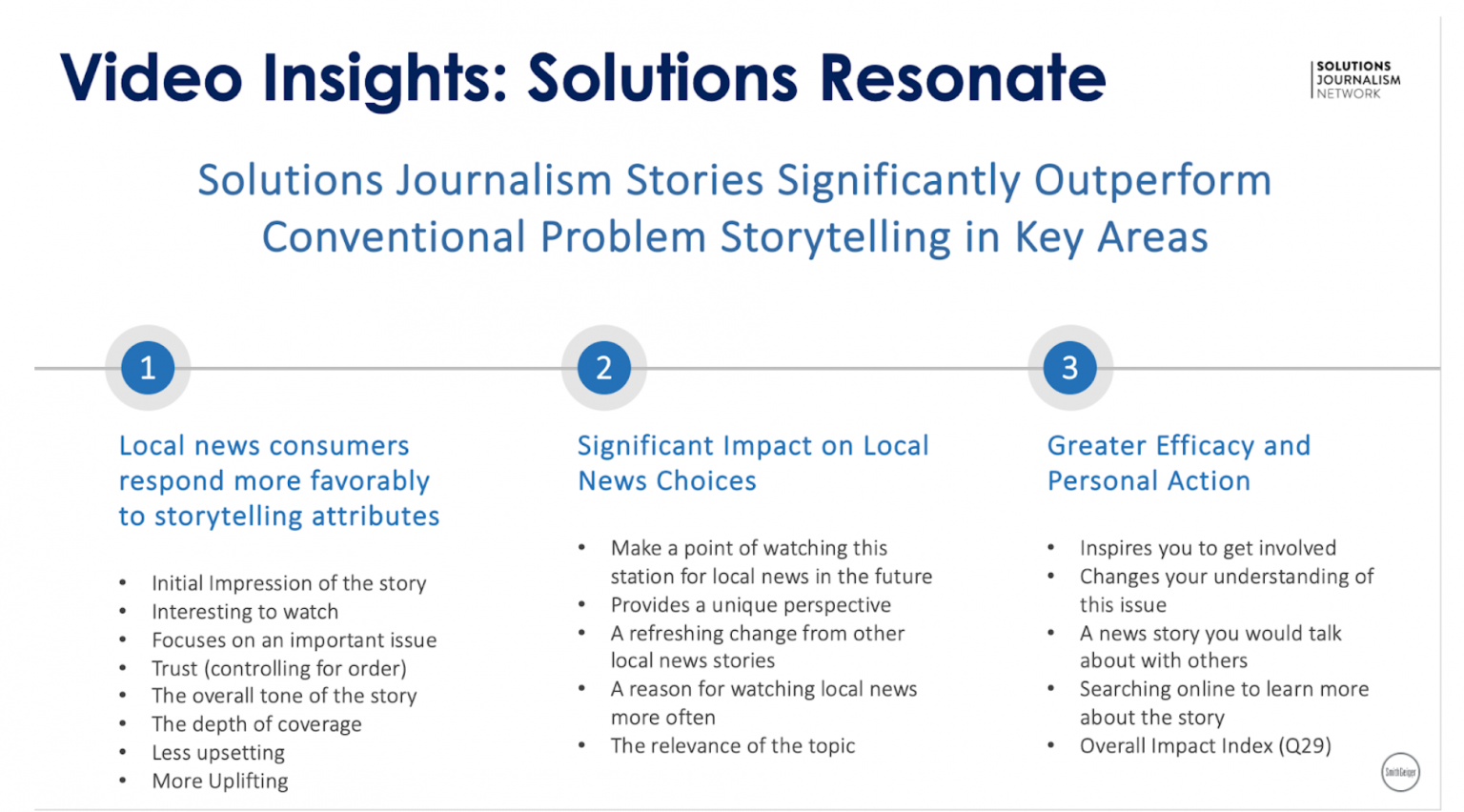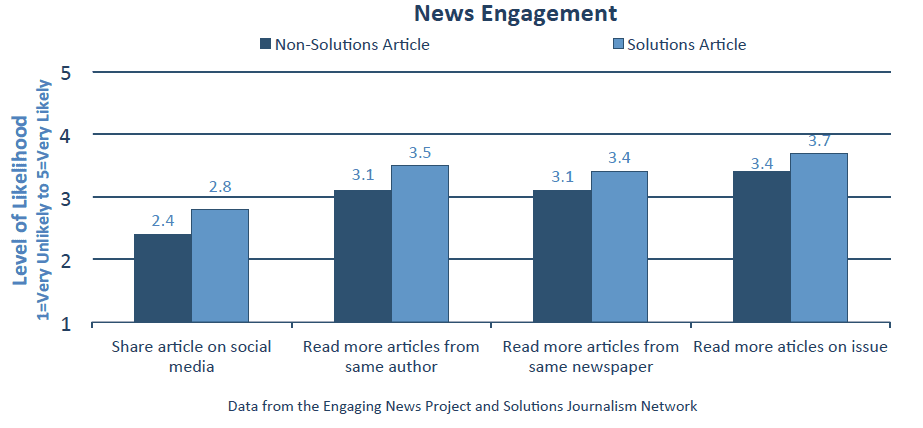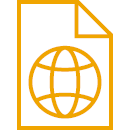
Home » Modules for Journalists » Marketplace » Getting constructive stories published » Handouts
Data can help sway editors and media managers who are skeptical of stories with a constructive approach. Studies and anecdotal evidence (mostly in the US and Europe) show that audiences engage with constructive journalism pieces more deeply, which can boost revenue for news organizations.

Source: SmithGeiger

A pitch summarizes the proposed story, explains its importance and relevance, how it’ll be produced and why the journalist pitching it is the best person to tell it. A pitch of a solutions story answers the same questions but puts a focus on a problem and a response being tried out to tackle it.
Pitching a solutions story can be more complicated because some editors still find them suspect. You’ll want to flag a few things very clearly in your pitch.
Why this story? So what? A solutions pitch is more likely to be accepted if the story relates to conversations the audience are having. The scope of the problem will affect what type of publication should be targeted; local, national, regional or international. Often there is a backstory to the solution that can make a pitch stand out to busy editors. In a constructive journalism pitch, data is needed. Research is crucial.
What’s the proof? Talk about indicators you’ve found that show this response is worth investigating. Think hard data, multiple credible sources, the kind of thing that helps the editor quickly see that you’re invested in a rigorous investigation.
Who are your sources? Good solutions stories talk to people affected by the response being tried out, not just the initiators or heads of organizations. Make sure the editor knows you’re speaking to the people actually targeted in this response. What do they think about it? In addition, including an outside voice, such as an independent expert, can also add credibility to your pitch.
What’s not working? Make sure your story contains an important element of a good solutions story: limitations. If including what’s not working so well in a response, you fend off accusations that your proposed story would simply be PR for an organization.
Why now? Look for a news peg that will tell the editor why this story should be written now as opposed to last week or a year from now. If there’s not a current news peg, the amount of time that has passed could act as the peg (example: “This initiative started three years ago and I’d like to look into the impact of its work so far.”). If an initiative or a group had a target by a certain time (example: educating 1,000 girls from xxx town by the end of the year), that could be the peg. Anniversaries, holidays or “international days” can also be pegs but remember, planning for these usually starts months before the date in question.
Why me? You should explain why you are the best person to produce the story. Talk about your expertise or track record with these kinds of stories. Mention sources and characters you have access to or an approach that could make the story stand out.

When writing your story pitch, go through this checklist. If you can answer yes to these questions, you’re on the right path to successfully selling your constructive piece.
You’ve got a story idea you want to pitch:
You’re thinking long term:
Checklist by Nikita Kozin from NounProject.com

The yearlong LEDE Fellowship allows journalists to conceptualize and execute solutions journalism projects alongside other entrepreneurs committed to extending the reach of solutions journalism and becoming the face of its future ($3,500).
The Local Media Project (LMP) is a five-year effort (launched in 2019) to establish solutions journalism-oriented collaboratives — groups of newsrooms and other civic institutions that together build trust in the communities they serve and stimulate public conversations about key issues. The LMP will support at least 15 collaboratives over the life of the initiative. Three collaboratives will join the LMP each year and will remain active members of the project for two years.
Most fellowships are for Danish journalists, editors and media employees only.
International fellows are welcome to apply for their own individual fellowship provided they have access to a stipend that will support them financially during the fellowship.
Mail at: fellowship@constructiveinstitute.org
Future Africa: Telling Stories, Building Worlds: Africa No Filter invites Extended Reality creators to apply for grants of up to $30,000 to support the production and development of new content. ANF will be commissioning work which uses immersive technology to tell stories about Africa. Grantees will be supported with on-going mentorship and production support and have the opportunity to showcase their projects in a virtual or in-person showcase.
The Kekere Storytellers Fund pays micro-grants to content creators, wordsmiths, performance artists, visual artists and journalists to create and publish content that shifts prevailing stereotypical narratives about their communities or subjects. ($500 – $2,000).
Selected Grantees will also be invited to virtually attend Electric South’s Creators Lab in February 2022.
www.africanofilter.org/future-africa-telling-stories-building-worlds
www.africanofilter.org/arts-and-culture-grants-for-emerging-artists-in-africa
The Henry Nxumalo Fund gives grants to individuals and organizations to do investigative journalism relevant to contemporary South Africa.
The program aims to diversify, strengthen and support innovation among independent media initiatives in Southern African countries through a mix of project funding, technical support, and capacity building over a three-year period.
www.samip.mdif.org/expansion-announcement/
Fellowships to Attend the 18th Global Investigative Journalism Conference
Overview: www.pulitzercenter.org/reporting-grants-fellowships
The Bertha Challenge is an opportunity for activists and investigative journalists to spend a year focussing on one pressing social justice issue.
www.berthafoundation.org/bertha-challenge/
WAN-IFRA Media Freedom invites African media organizations to apply for a grant of $10,000 USD to assist newsrooms in telling the story of climate change.
Media from Botswana, Kenya, Malawi, Rwanda, South Africa, Tanzania, Uganda, Zambia and Zimbabwe are eligible to apply.
n-ifra.org/initiatives/african-media-grants/
Climate Misinformation Grant Program
General Fellowship: Early-career professional journalists from developing countries with proficiency in English can apply for a six-month fellowship. Alfred Friendly provides fellows with basic and advanced hands-on instruction at the Missouri School of Journalism and places them in leading US newsrooms. The successful candidate will be 25-35 years old and have at least three years of experience as a journalist at a print, online or broadcast media outlet. Participants work as staff reporters in their host newsrooms are required to develop training plans that they implement when they return to their home newsrooms. The all-inclusive fellowship starts in mid-March and ends in early September.
TRACE Investigative Reporting Fellowship: The TRACE Foundation was established to promote, support and fund research, investigative journalism, publications, videos and related projects that encourage greater commercial transparency and advance anti-bribery education. The six-month fellowship program is in conjunction with the Alfred Friendly Press Partners Fellowship (see above), but the two journalists selected will receive extra training on investigative journalism.
Offers grants to reporters in the Middle East and North Africa with investigative story ideas to journalists in Jordan, Syria, Lebanon, Egypt, Yemen, Iraq, Palestine, Tunisia, or Bahrain.
Provides opportunities for journalists around the world to report on environmental and conservation stories. Mongabay is organized into regional editorial teams that commission and assign stories associated with multiple Special Reporting Projects.
“Reporting Grants for Women’s Stories” is a funding initiative of “The International Women’s Media Foundation” and supports journalism produced by and about women.The grants are aimed at women journalists who pursue international stories of importance through gender-sensitive coverage of underreported topics.Grants average US$5,000 and will be awarded to cover reporting-related costs including travel, logistics, visa fees and payment for fixers/translators.
Kenya Inclusive Governance, Accountability, Performance and Participation (Kenya-IGAPP) Program www.grants.gov/web/grants/view-opportunity.html?oppId=331260
Individual Research Fellowships
www.ssrc.org/programs/african-peacebuilding-network/apn-individual-research-fellowships/
The goal is to show fellows how the US founding principles of a free press and journalistic best practices help foster transparency and accountability of government institutions, businesses and organizations, including the most powerful ones. Fellows go on a guided tour across the country and meet and interview subject matter experts in media outlets, think tanks and advocacy organizations.
www.worldpressinstitute.org/application/instructions
AMI’s overall goal is to promote the development of pluralistic media as a necessary and critical ingredient of democratic governance, economic and human development, and informed citizen engagement in Africa. Its approach is informed by extensive research into media action on the continent. This coheres with its strategic goal of reducing the gap between media content and the development agenda of countries in Africa.
www.fojo.se/en/programmes/international-training-programmes/
In Africa, it supports traditional media, community radio stations, and bloggers in 18 countries. DW Akademie’s activities focus on strengthening high-quality, independent media and the sustainable development of training systems for media professionals. It provides grants to advance freedom of expression and access to information, especially for digital technologies.
International Training Programme: The Sida-financed International Training Programme (ITP), Media Regulation in a Democratic Framework, is a full-scale capacity building programme aimed at actual change towards a more efficient and sustainable planning and implementation of media self-regulation.
The American foundation has regional offices in Nairobi, Lagos, and Johannesburg. It supports investigative journalism that holds leaders and institutions accountable, storytelling that seeks to give a voice to marginalized or silenced sections of society, and innovative projects aiming to connect and reach as many people as possible. Ford accepts unsolicited proposals, and their grant deadlines are rolling. Grant amounts range from between $50,000 to $1.25 million.
Hivos provides grants to media organizations whose work aligns with its objectives and focus areas, including women’s rights and renewable energy. Hivos is particularly interested in innovative media organizations and journalism highlighting alternative solutions to persistent problems.
The IWMF’s Howard G. Buffett Fund for Women Journalists
www.iwmf.org/our-programs/grant-application-guide
Kim Wall Memorial Fund
Civic Empowerment, Data & Digital Rights, Financial Transparency, and Independent Media:
International Fund for Public Interest Media: Support to independent media to enable their development, sustainability and independence – especially in resource-poor and fragile settings.
Baraza Media Lab: Strengthening Kenya’s media ecosystem
www.luminategroup.com/baraza-media-lab
RESET: Support the individuals, organisations, and communities working around the world to address the damage inflicted by surveillance capitalism on human rights, democracy, and open societies.
MFWA is a media development NGO operating in all 16 West African countries. It has a freedom of expression program, as well as a media and good governance initiative that offers regular training opportunities and supports investigative journalism through grants.
MISA’s activities are geared towards promoting free, independent and pluralistic media in the region through advocacy, capacity-building for media workers, media freedom monitoring, campaigning for freedom of expression and right to information, and offering legal support. Activities vary in each national chapter, with program implementation determined by the political climate and needs in each country.
Facilitating independent cross-border investigative journalism by connecting donors and journalists to promote democracy in Europe. Overview of different grant opportunities:
The Open Society Foundations are one of the biggest private funders of media projects worldwide. Their Africa Office in London works closely with its four Africa regional operations and national offices. The regional operations fund media organizations, coalitions, movements and journalists whose projects align with their priority areas. Overview of different Grant Opportunities and Fellowships: www.opensocietyfoundations.org/grants
The fund is for non-fiction media across all platforms (film, radio, photojournalism, print, online and multimedia) that tells original and engaging stories from the developing world.
As a part of its development cooperation with the global South, Switzerland’s international development agency runs more than 800 projects and programs in the areas of health and training, job and income creation, rural development, state reform, and administrative reforms.
www.eda.admin.ch/deza/en/home/projekte/what-projects-project-database.html
Al Jazeera annual fellowship for Journalism research.
www.ijnet.org/en/opportunity/al-jazeera-offers-journalism-fellowship-mena
Taco Kuiper Grants to encourage investigative journalism in South African print media. A fund of up to R350 000 is available annually. Grants are available for print journalists or print publications seeking pre-publication help reporting of public interest.
The Africa-China Reporting Project (ACRP), hosted at the Centre for Journalism at the University of the Witwatersrand in Johannesburg, aims to improve the quality of reporting on Africa-China issues by providing facilitation and capacity-building for journalists via reporting grants, workshops and other opportunities.
Scholarships offered on various subjects by the Radio Nederland Training Centre (RNTC), a Netherlands-based training institute. Courses include Data and Investigative Journalism, Narrative Journalism, and Using Media for Development.
The Freedom of Expression Awards Fellowship celebrates individuals or groups who have had a significant impact fighting censorship anywhere in the world. Index works with the winners to provide longer-term assistance to help fellows maximize their impact and broaden their networks. Open to individuals or organizations involved in tackling free expression threats, including journalists.
www.indexoncensorship.org/freedom-of-expression-awards-fellowship
Applicants, including freelance writers, must be currently engaged with media institutions or actively pursuing journalism as a full-time profession. The 2022 program aims to shed light on how disinformation happens in Southeast Asian countries in different contexts that affect various human rights: public participation, religious, ethnic and cultural discrimination, gender rights, and freedom of expression and other civil liberties (including press freedom).
AJF brings together experienced journalists from varied backgrounds and working in widely differing circumstances to learn and work together in Singapore. Organized for Asian journalists and held in Asia, the goal is to build networks and friendships across borders.
SAJA Reporting Fellowship is open to proposals on any in-depth topics covering South Asia or the South Asian Diaspora. It is open to freelancers and staff journalists in any medium, and aims to encourage in-depth reporting projects by providing grants to cover a portion of reporting expenses. A total of up to $20,000 may be given out annually, divided among projects or a single project at SAJA’s discretion. Each fellowship award is typically between $3,000-$7,000.
GFMD’s is an international network of journalism support and media development organizations working in around 50 countries. They offer information on a wide variety of programs supporting journalists. Grants include funding for the climate and environment, solutions approaches to human trafficking and labor exploitation stories, and many others.
Coda Story’s Bruno Reporting Fellowships to fund an enterprise feature relevant to Coda Story’s topics of interest. The fellowships support three 3-month reporting projects that culminate in a story to be published on Coda’s website and editorial partners’ websites. It is designed to benefit early career journalists working in countries where journalism is under-resourced and the issues pertinent to Coda’s editorial concerns are under-scrutinized. Journalists in Southeast Asia, South Asia, Central Asia, and Africa are especially encouraged to apply.
www.codastory.com/stayonthestory/coda-bruno-reporting-fellowships
The Adenauer Fellowship for Media and Communication in Asia is a scholarship offered by the Konrad Adenauer Stiftung (KAS),a German political foundation. KAS partners with educational institutions to offer journalism scholarships in Bangladesh, India, Pakistan and the Philippines. The training takes place online as well as at the institutes and focuses on practical journalism training, news media, reporting and photojournalism. Semester grants from 500-700 EUR or payment of tuition fees up to 6,000 EUR.
This fellowship is aimed at mid-career This fellowship is aimed at mid-career journalists from South Asian countries including Afghanistan, Bangladesh, Bhutan, India, Nepal, Pakistan, Sri Lanka, and the Maldives. Fellows will undertake a bespoke 8-week fellowship titled “Good Governance in a Changing World: the Media, Politics and Society”. The programme explores the different ways in which the media play a part in holding democratic processes to account, including government, the civil service and security, as well as the broader political system in both the South Asia region and the UK.

The Michael Elliott Award for Excellence in African Storytelling.
www.icfj.org/our-work/michael-elliott-award-excellence-african-storytelling
Breakthrough Journalism Award, Taken: Civil Asset Forfeiture Grants.
www.pulitzercenter.org/grants-fellowships/opportunities-journalists/breakthrough-journalism-award
Anja Niedringhaus Courage In Photojournalism Award
www.iwmf.org/our-awards/anja-award-application-guidelines/
Courage in Journalism Awards
www.iwmf.org/awards/courage-in-journalism-awards/
Gwen Ifill Award
www.iwmf.org/programs/gwen-ifill-mentorship-program
WAMECA – West Africa Media Excellence Conference and Awards) is an initiative to promote media excellence in the sub-region with annual awards in different journalism categories.
Environmental Journalism Awards: The awards are offered as part of the Cairo Climate Talks, a series of monthly events held in cooperation between the German Embassy in Cairo and the Egyptian Ministry of Environmental Affairs with the aim of providing a platform to exchange experience, raise awareness, and foster cooperation between policymakers, the business community, the scientific community, and civil society. For Egyptian journalists (deadline 16th December 21)
ijnet.org/en/opportunity/environmental-journalism-awards-open-egyptian-journalists-egypt
The World Press Photo Contest recognizes and celebrates the best photojournalism and documentary photography produced over the last year. Annual contest.